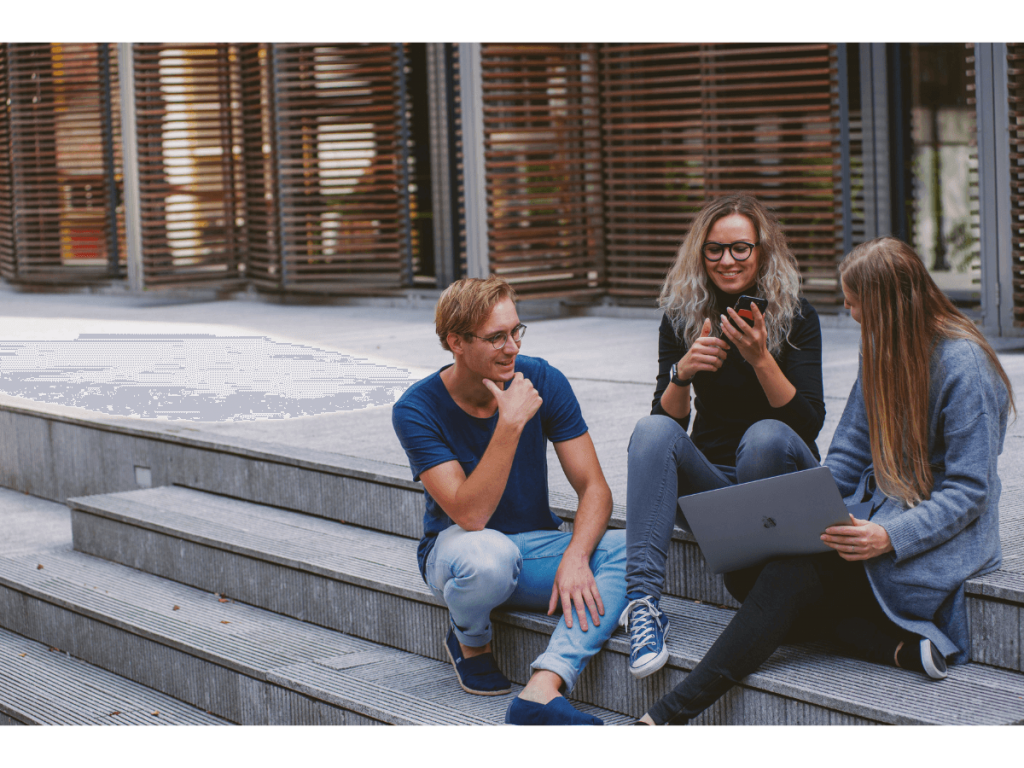Picture this: you, sitting with a cup of coffee, pondering the three things you value most. How quickly have the answers come to you? Was it a quick flash of thoughts or was the answer more nebulous?
I get it; knowing ourselves, despite living in our bodies 24/7, can be a puzzle, a bit like meeting a new friend who’s been tagging along since birth.
In this post, we’re diving deep into the what, how, and why of self-awareness—a journey to unlock your best self. So, buckle up, grab your favourite drink, and let’s embark on this adventure together. Because, hey, who knows you better than you? Or maybe, we’re about to find out.

What is Self-Awareness?
Self-awareness is the capacity to assess the alignment of your actions, thoughts, and emotions with your identity, values, convictions, and desires, while also accurately grasping how others perceive you. Achieving this requires a combination of emotional intelligence, precise self-awareness, and self-confidence.
Let’s imagine David who reacts to criticism with insults. Over time, he noticed that this was having a negative impact on his relationships. He embarked on anger management to address his impulsive reactions, through which he recognized that acceptance was one of his core values.
This self-reflection allowed David to reframe criticism as constructive feedback, leading to improved responses over time. As a result, his relationships improved, he gained a sense of control, made better decisions, and communicated with clarity and intention, showcasing the transformative power of self-awareness.
David’s example illustrates how self-awareness is important to understand why we react the way we do, how that is impacting us and others, and what we can do to be closer to our desired self.
Benefits of Self-Awareness
Using David’s example again, there are some additional benefits of his self-awareness work:
- Emotional intelligence boost: David had better control over his anger and other emotions, making it easier to connect with others.
- Smart decision-making: David could align his choices with this core value of acceptance, leading to smarter and more meaningful decisions.
- Smooth communication skills: David became an active listener, understanding others’ perspectives with ease and fostering better communication.
- Improved resilience: Friendships, relationships, and work dynamics became smoother, giving David the energy and resilience to face other challenges head-on.
- Peaceful conflict resolution: David seamlessly stepped into the role of a mediator when others experienced similar conflicts, contributing to peaceful conflict resolution.
- Confidence boost: David stood taller and more confident because he knew he could handle what life threw his way.
- Increased empathy: David’s self-awareness and personal development led to a deeper understanding of others, fostering increased empathy and stronger connections.
- Enhanced stress management: With a calmer approach to challenges, David experienced reduced stress, allowing him to navigate work pressures more effectively.
- More opportunities in life: With an open mindset and better relationship-building skills, David received more opportunities for professional progression.
People with self-awareness are happier and have better relationships. They also experience a sense of personal and social control as well as higher job satisfaction.

Three Tools to Become More Self-Aware?
Get to know yourself
When starting your self-awareness journey, it can sometimes be hard to express your values, feelings etc. However, giving an experience a word can help you build awareness of what is going on with you.
- How would I describe myself to a stranger? How would I describe my personality, body, home, hobbies, etc?
- What is important to me? Consider relationships, personal growth, career aspirations, etc.
- What made me happy in the past week?
- What frustrated me in the past week?
- What am I proud of?
- What would I want to change about myself?
Take one question at a time and jot down whatever comes to your mind.
It is okay if you struggle with some of those questions. This just means you are at the starting point of your awareness journey.
In a few months, you can repeat the exercise and compare notes to see how far you got.
Visualize the Best Version of Yourself
Our ideal selves reflect our hopes, dreams, and aspirations, and speak to our skills, abilities, achievements, and accomplishments that we wish to attain.
- What skills and abilities do you want to have?
- Think about a moment in your life when you felt truly accomplished. What were you doing, and how did it make you feel?
- Consider your aspirations. What does success look like in your ideal world?
- How does your best self handle setbacks and obstacles?
- In moments of doubt, what mantra or belief does your ideal self hold onto?
As you lean into your strengths to become the better version of yourself, you can use this idealized self to keep moving in the right direction and not be distracted by setbacks and other obstacles.
Ask “What” Questions
At the core of self-awareness is the ability to self-reflect. Most people approach this by asking “Why?”. The trouble is, we can get stuck looking for a reason or focusing on our weaknesses and insecurities, rather than looking for ways we can overcome them.
Consider Amy, a new junior executive who has difficulty speaking up in meetings. Instead of “Why don’t I speak up at meetings?” we could ask:
- What were the interpersonal dynamics in the room?
- What was I experiencing in my body at the time? What feelings or thoughts have I had?
- What happened that caused me to close down?
- What can I put in place so that I can speak up?
With “what” questions, we can examine behavioural patterns and stories that do not serve us so that we can move forward. “What” questions empower the person to look for ways to resolve the issue.
Can you recall a situation where you wanted to behave in a certain way but you felt blocked? Use the questions from Amy’s example to find new ways of responding.
In case you find it difficult to answer those questions or your solutions are not working, there might be a deeper root cause at play. In this situation, it’s advisable to work with a trained therapist who can support you in delving into your subconscious to provide emotional healing and closure.
Ask Others How They See You
Now that you’ve discovered who you are and who you would ideally like to be, ask other people how they perceive you in certain situations.
Feedback doesn’t need to be scary. Here are some examples of questions you can ask:
- How would you describe me?
- How am I as a friend/partner etc.?
- What do you think am I good at?
- What, in your opinion, might be holding me back from reaching my full potential?
- Can you recall instances where my response to a specific situation stood out? What, in your eyes, made it stand out?
- How do you perceive my reactions in challenging or stressful situations?
Those questions can be asked generally or about a particular situation.
Once you have collected feedback from your friends, family and coworkers, compare this with your self-understanding. Look for discrepancies as you might have blind spots you might need to attend to.
Keep a Self-Awareness Journal
You can collect all the answers of your self-awareness exploration in one place and you can come back to it whenever you would like.
Journalling is also a great way to pay attention to what’s going on in your private and public life. It will also help you to recognize patterns over time. Some questions you might ask yourself:
- What did I do well today?
- What challenges did I face?
- What was I feeling?
- How did I respond? In retrospect, could I have responded differently?
- What strengths did I use to keep me focused on the best version of myself?
- What is my intention for tomorrow?
Practice Meditation
Meditation is another practice you can insert into your daily life that can help you develop greater self-awareness and self-control.
There are a variety of meditations and activities you can try to build mindfulness, including:
- Practice deep breathing
- Name you surroundings
- Organize your space
- Draw or paint
- Do a body scan meditation
- Write about what you are grateful for
- Go for a walk
- Infuse your home with some essential oils
Try out which ones work for you best. I like to imagine a ball of fun colours going through the part of my body I’m scanning. The colour and movement help me see how I am doing. In addition, breathing practices sometimes made me more anxious than relaxed so I had to break it off.
Mindfulness meditations work best when you are working with your body. Forcing anything because you “should” do it will only cause more distress.
Consider Professional Help
There are multiple helpfulness services that you can utilize, the most relevant to self-awareness are coaching and therapy. When looking into working with a professional, consider what kind of help you require.
While therapy typically delves into past experiences, healing, and addressing psychological issues, coaching is future-oriented and geared toward personal and professional development. Therapy aims to resolve emotional or mental health concerns, whereas coaching aims to enhance your skills, mindset, and performance.
Here’s an article that explains coaching a bit more in detail.
Conclusion
Navigating the empowering path of self-awareness brings its unique set of growth opportunities. If you find yourself grappling with these questions or your solutions aren’t yielding the expected results, remember, you’re not alone. Encountering difficulties, especially in the early stages of self-reflection, is not a setback but a natural part of the journey.
Should you find the process challenging, consider exploring alternative strategies to enhance your self-awareness journey. Break down the questions into smaller, more manageable parts. Share your thoughts with a trusted friend or mentor who can offer fresh perspectives. Consistently engaging in mindfulness practices or journaling will lead to ongoing insights and continuous personal development. The road to self-awareness is not a one-time event but a fulfilling and evolving expedition towards your best self.
